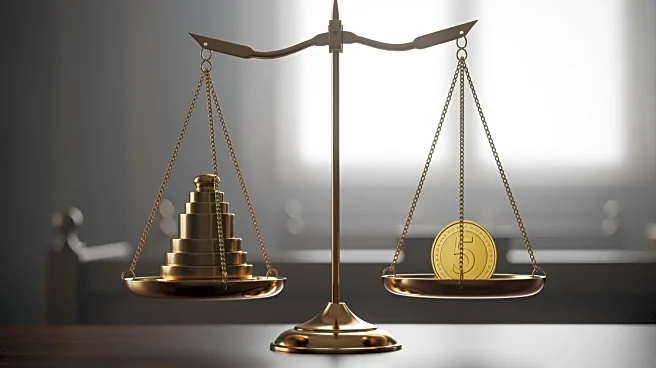What's Happening?
A federal jury in New York has awarded nearly $21 million to three U.S. citizens who were displaced from Sudan, holding France's largest bank, BNP Paribas, accountable for facilitating the Sudanese government's
access to the U.S. financial system during a period of severe human rights abuses. The plaintiffs, who lost their homes and property, received between $6.7 million and $7.3 million each. The case centers on BNP Paribas's role in enabling Sudanese authorities to access international money markets from 2002 to 2008, a period during which atrocities in the Darfur region resulted in the deaths of up to 300,000 people and the displacement of 2.7 million. The bank has expressed its intention to appeal the verdict, arguing that it did not knowingly assist the Sudanese government in human rights violations.
Why It's Important?
This verdict is significant as it holds a major financial institution accountable for its indirect role in human rights abuses, setting a precedent for similar cases. The decision could impact BNP Paribas's reputation and financial standing, as well as influence other banks' operations in regions with known human rights issues. The case highlights the legal and ethical responsibilities of financial institutions in global markets, particularly in conflict zones. It also underscores the ongoing challenges in achieving justice for victims of atrocities, as the plaintiffs' lawyer aims to extend the findings to other Sudanese refugees in the U.S.
What's Next?
BNP Paribas plans to appeal the verdict, citing strong grounds for challenging the decision. The appeal process could lead to further legal scrutiny and potentially alter the outcome. Meanwhile, the plaintiffs' attorney intends to leverage the case as a 'bellwether trial' to support claims from other Sudanese refugees, potentially expanding the scope of accountability for BNP Paribas. The bank's previous settlement in 2014, where it paid nearly $9 billion for processing transactions for Sudan, Cuba, and Iran, may also be revisited in light of this new verdict.
Beyond the Headlines
The case raises broader questions about the role of financial institutions in global human rights issues and their accountability in facilitating transactions that may indirectly support oppressive regimes. It also highlights the complexities of international law and the challenges in prosecuting entities for actions that contribute to human rights violations. The ongoing civil war in Sudan and the detention of former President Omar Hassan Ahmad Bashir, charged with genocide, further complicate the pursuit of justice for victims.










